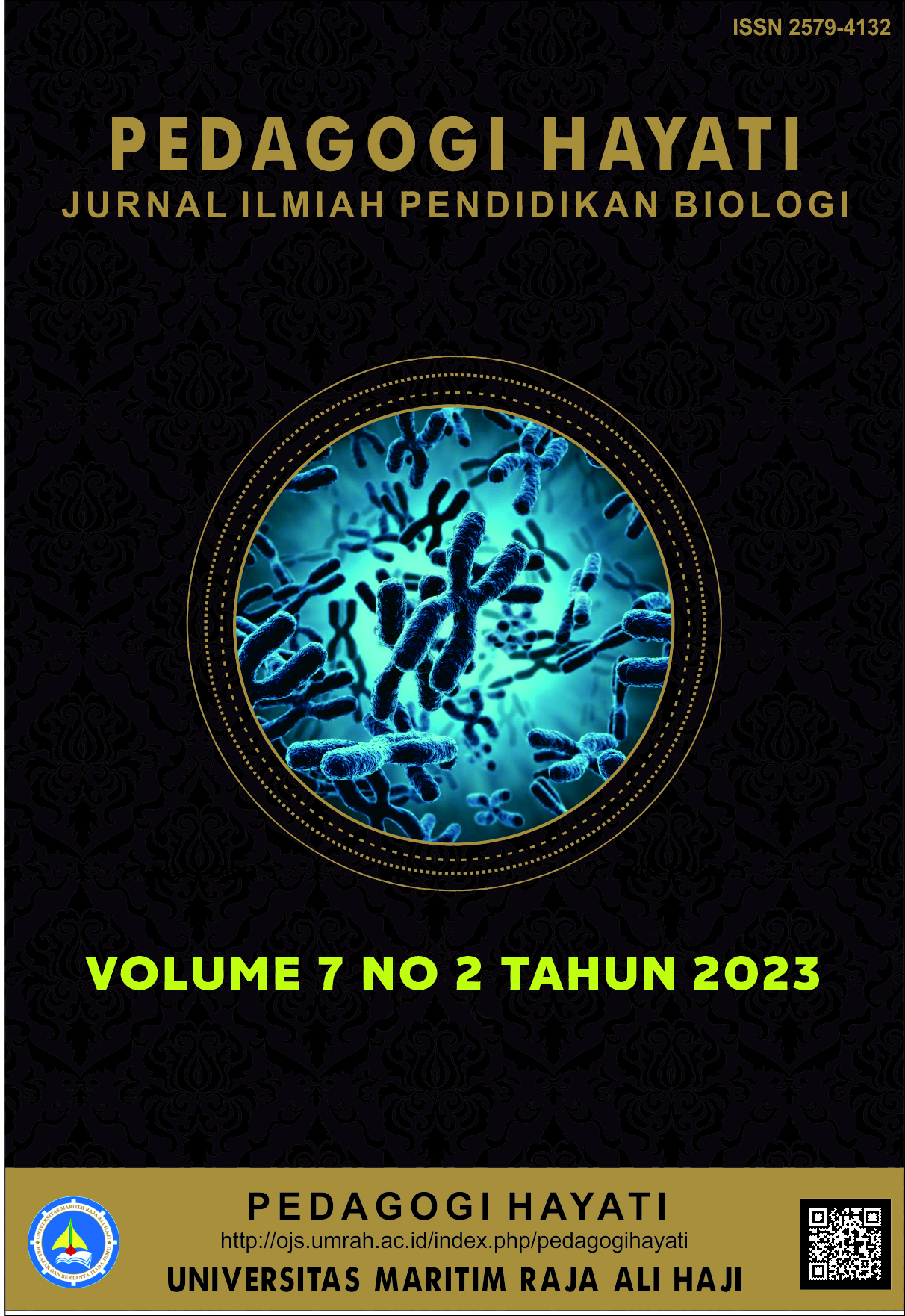Research Skills of Prospective Biology Teacher: An Analysis for Development Needs
DOI:
https://doi.org/10.31629/ph.v7i2.6998Keywords:
research skills, information literacy, biology lab skills, prospective biology teacherAbstract
This study was conducted to determine the extent to which research skills have been mastered by prospective biology teacher in learning at universities and to determine the need for developing research skills. Research skills are defined as skills using information literacy and basic biology laboratory skills related to research. An analysis of curriculum documents and examples of RPS from the biology education study program at one of the universities in the Kepulauan Riau Province was carried out to explore lecture designs that prepare students' research skills. A total of 25 alumni (graduates) of the study program were involved in a perception survey of how important research skills are for them in the workplaces. 27 final year students were also involved in providing self-assessments about their ability to master information literacy and basic biology laboratory skills. Data was analyzed qualitatively and quantitatively. Data analysis resulted that the researcher profile is one of the targets for graduates of biology education study programs but has not been supported by course designs. Research skills are needed by alumni in the workplaces and are very relevant to support their careers. Information literacy and basic biology lab skills have not been fully mastered by final year students. There is an urgency to equip students with more adequate skills so that students are better able to carry out research, including completing their studies.
References
Ain, C. T., Sabir, F., & Willison, J. (2019). Research skills that men and women developed at university and then used in workplaces. Studies in Higher Education, 44(12), 2346–2358. https://doi.org/10.1080/03075079.2018.1496412
Aripin, I., Hidayat, T., Rustaman, N. Y., & Riandi, R. (2021). Prospective biology teachers’ research skills. Journal of Physics: Conference Series, 1806(1), 7–12. https://doi.org/10.1088/1742-6596/1806/1/012170
Babbie, E. (2014). The practice of social research (14th ed.). CENGAGE Learning Custom Publishing.
Baldwin, G. (2005). The teaching-research nexus: how research informs and engances learning and teaching at the University of Melbourne. Centre for the Study of Higher Education, University of Melbourne. http://www.cshe.unimelb.edu.au/
Bazhenov, R. I. (2019). Arranging student scientific research as an educational technology: The experience of regional universities of Russia. Education Research International, 2019. https://doi.org/10.1155/2019/8358954
Huddleston, B. S., Bond, J. D., Chenoweth, L. L., & Hull, T. L. (2019). Faculty perspectives on undergraduate research skills nine core skills for research success. Reference and User Services Quarterly, 59(2), 118–130. https://doi.org/10.5860/rusq.59.2.7277
Jacobsen, M., McDermott, M., Brown, B., Eaton, S. E., & Simmons, M. (2018). Graduate students’ research-based learning experie nces in an online master of education program. Journal of University Teaching and Learning Practice, 15(4). https://doi.org/10.53761/1.15.4.4
Lamanauskas, V., & Augiene, D. (2017). Scientific research activity of students pre-service teachers of sciences at university: The aspects of understanding, situation and improvement. Eurasia Journal of Mathematics, Science and Technology Education, 13(1), 223–236. https://doi.org/10.12973/eurasia.2017.00613a
Loveys, B. R., Kaiser, B. N., Mcdonald, G., Kravchuk, O., Gilliham, M., Tyerman, S., & Able, A. J. (2014). The Development of Student Research Skills in Second Year Plant Biology. 22(3), 15–25.
Maddens, L., Depaepe, F., Janssen, R., Raes, A., & Elen, J. (2021). Research skills in upper secondary education and in first year of university. Educational Studies, 47(4), 491–507. https://doi.org/10.1080/03055698.2020.1715204
Noguez, J., & Neri, L. (2019). Research-based learning: a case study for engineering students. International Journal on Interactive Design and Manufacturing, 13(4), 1283–1295. https://doi.org/10.1007/s12008-019-00570-x
Pavlova, I. V., Remington, D. L., Horton, M., Tomlin, E., Hens, M. D., Chen, D., Willse, J., & Schug, M. D. (2021). An introductory biology research-rich laboratory course shows improvements in students’ research skills, confidence, and attitudes. PLoS ONE, 16(12 December), 1–27. https://doi.org/10.1371/journal.pone.0261278
Peyton, B. M., & Skorupa, D. J. (2021). Integrating CUREs in Ongoing Research: Undergraduates as Active Participants in the Discovery of Biodegrading Thermophiles. Journal of Microbiology & Biology Education, 22(2). https://doi.org/10.1128/jmbe.00102-21
Salmento, H., Murtonen, M., & Kiley, M. (2021). Understanding Teacher Education Students’ Research Competence Through Their Conceptions of Theory. Frontiers in Education, 6(November), 1–9. https://doi.org/10.3389/feduc.2021.763803
Sukri, A., Sakti, H. G., Rizka, M. A., Lestari, I., Lukitasari, M., & Ayu, I. W. (2023). Research Skills Profile of Prospective Science Teacher Viewed from Gender (Vol. 1). Atlantis Press SARL. https://doi.org/10.2991/978-2-38476-056-5_61
Torres, L. (2018). Research skills in the first-year biology practical - Are they there? Journal of University Teaching and Learning Practice, 15(4). https://doi.org/10.53761/1.15.4.3
Willison, J., & O’Regan, K. (2006). Handbook for Research Skill Development and Assessment in the Curriculum (Issue Level 4). The University of Adelaide.
Willison, J. W. (2018). Research skill development spanning higher education: Critiques, curricula and connections. Journal of University Teaching & Learning Practice, 1(1990), 151–174.
Wisker, G. (2018). Frameworks and freedoms: Supervising research learning and the undergraduate dissertation. Journal of University Teaching and Learning Practice, 15(4). https://doi.org/10.53761/1.15.4.2
Zelaya, A. J., Gerardo, N. M., Blumer, L. S., & Beck, C. W. (2020). The Bean Beetle Microbiome Project: A Course-Based Undergraduate Research Experience in Microbiology. Frontiers in Microbiology, 11(September), 1–11. https://doi.org/10.3389/fmicb.2020.577621


















